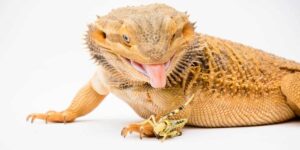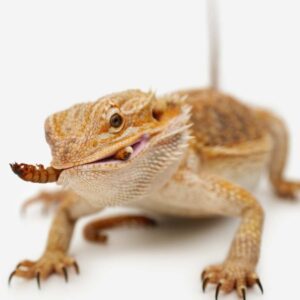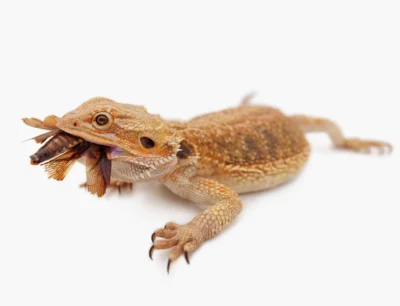Bearded dragons, revered for their captivating demeanor and unique personalities, are among the most popular reptile pets globally. As omnivores, their diet primarily consists of a combination of insects, vegetables, and occasionally fruits.
However, one of the critical components of their diet is insects, providing essential nutrients crucial for their growth and overall well-being. In this guide, we delve into the world of entomophagy for bearded dragons, exploring the diverse array of insects that constitute a healthy diet for these fascinating reptiles.
From crickets to mealworms and beyond, understanding what insects can bearded dragons eat is pivotal in ensuring their optimal health and vitality.
What insects can bearded dragons eat? – 50 common insects to consider

Providing a varied diet for your bearded dragon is essential for its health and well-being. Here’s a list of 50 safe insects commonly fed to bearded dragons, along with their nutritional values and size considerations:
- Crickets: Rich in protein and calcium. Size should be no larger than the space between the bearded dragon’s eyes.
- Dubia Roaches: High in protein, calcium, and low in fat. Suitable for all sizes of bearded dragons.
- Mealworms: High in protein but low in calcium. Suitable for adult bearded dragons due to their hard exoskeleton.
- Superworms: Similar to mealworms but larger. High in protein and fat. Suitable for adult bearded dragons only.
- Phoenix Worms (Black Soldier Fly Larvae): High in calcium and low in fat. Suitable for all sizes of bearded dragons.
- Silkworms: Rich in protein and calcium. Suitable for all sizes of bearded dragons.
- Butterworms: High in fat and calcium. Suitable as occasional treats for adult bearded dragons.
- Hornworms: High in water content, low in fat, and moderate in protein. Suitable for all sizes of bearded dragons.
- Waxworms: High in fat and low in protein. Suitable as occasional treats for adult bearded dragons.
- Blue Bottle Flies: Rich in protein and low in fat. Suitable for all sizes of bearded dragons.
- Black Soldier Fly Adults: High in protein and calcium. Suitable for all sizes of bearded dragons.
- Earthworms: Rich in protein and low in fat. Suitable for all sizes of bearded dragons.
- Redworms: Similar to earthworms in nutritional value. Suitable for all sizes of bearded dragons.
- Pillbugs (Rollie Pollies): Low in protein but high in fiber. Suitable for all sizes of bearded dragons.
- Crane Flies: High in protein and low in fat. Suitable for all sizes of bearded dragons.
- Grasshoppers: Rich in protein and moderate in fat. Suitable for adult bearded dragons.
- Locusts: High in protein and low in fat. Suitable for all sizes of bearded dragons.
- Morio Worms (Giant Mealworms): High in protein and fat. Suitable as occasional treats for adult bearded dragons.
- Bamboo Worms: Rich in protein and calcium. Suitable for all sizes of bearded dragons.
- Fruit Flies: Low in protein and fat. Suitable for juvenile bearded dragons.
- Bean Beetles: High in protein and low in fat. Suitable for all sizes of bearded dragons.
- Spider Beetles: Rich in protein and low in fat. Suitable for all sizes of bearded dragons.
- Houseflies: Moderate in protein and fat. Suitable for all sizes of bearded dragons.
- Green Bottle Flies: High in protein and low in fat. Suitable for all sizes of bearded dragons.
- Phoenix Worm Pupae: High in calcium and low in fat. Suitable for all sizes of bearded dragons.
- Silkworm Pupae: Rich in protein and calcium. Suitable for all sizes of bearded dragons.
- Butterfly Pupae: Moderate in protein and fat. Suitable for all sizes of bearded dragons.
- Cockroaches (Dubia, Red Runner, etc.): High in protein and calcium. Suitable for all sizes of bearded dragons.
- Buffalo Worms: High in protein and fat. Suitable as occasional treats for adult bearded dragons.
- Moths: Moderate in protein and fat. Suitable for all sizes of bearded dragons.
- Termites: Rich in protein and low in fat. Suitable for all sizes of bearded dragons.
- Weevils: Moderate in protein and fat. Suitable for all sizes of bearded dragons.
- Maggots: High in protein and low in fat. Suitable for all sizes of bearded dragons.
- Ants: Rich in protein and low in fat. Suitable for all sizes of bearded dragons.
- Earwigs: Moderate in protein and fat. Suitable for all sizes of bearded dragons.
- Dragonflies: High in protein and low in fat. Suitable for adult bearded dragons.
- Mayflies: Moderate in protein and fat. Suitable for all sizes of bearded dragons.
- Stoneflies: High in protein and low in fat. Suitable for adult bearded dragons.
- Beetles (various species): Rich in protein and low in fat. Suitable for all sizes of bearded dragons.
- Dobsonflies: Moderate in protein and fat. Suitable for all sizes of bearded dragons.
- Walking Sticks: High in protein and low in fat. Suitable for adult bearded dragons.
- Leafhoppers: Moderate in protein and fat. Suitable for all sizes of bearded dragons.
- Planthoppers: Rich in protein and low in fat. Suitable for all sizes of bearded dragons.
- Leaf Beetles: High in protein and low in fat. Suitable for all sizes of bearded dragons.
- Stick Insects: Moderate in protein and fat. Suitable for all sizes of bearded dragons.
- Springtails: Low in protein and fat. Suitable for all sizes of bearded dragons.
- Booklice: Low in protein and fat. Suitable for all sizes of bearded dragons.
- Silverfish: Low in protein and fat. Suitable for all sizes of bearded dragons.
- Jumping Bristletails: Low in protein and fat. Suitable for all sizes of bearded dragons.
- Land Snails: Moderate in protein and fat. Suitable for all sizes of bearded dragons.
Always ensure the insects you offer are gut-loaded and properly dusted with calcium and vitamin supplements according to your bearded dragon’s age and requirements. Rotate their diet to provide a balanced nutritional intake. Additionally, ensure the insects you offer are from a safe and pesticide-free source.
Variety in the Diet
Variety in your bearded dragon’s diet is crucial to ensure they receive a wide range of nutrients necessary for their health and development. Here’s why variety matters:
- Nutritional Balance: Different insects and foods contain varying levels of essential nutrients such as protein, calcium, vitamins, and minerals. By offering a variety of foods, you can help ensure your bearded dragon receives a balanced diet.
- Prevent Nutritional Deficiencies: Feeding the same type of food exclusively can lead to nutritional deficiencies or excesses. For example, relying solely on mealworms can result in calcium deficiency due to their low calcium content. Offering a variety of insects and vegetables helps prevent such deficiencies.
- Behavioral Stimulation: Bearded dragons are opportunistic feeders and naturally enjoy exploring and hunting for food. Providing a variety of foods mimics their natural feeding behavior and keeps them mentally stimulated.
- Palatability: Just like humans, bearded dragons may have preferences when it comes to food. Offering a variety of options allows you to observe their preferences and ensure they consume an adequate amount of food.
- Prevent Food Boredom: Offering the same type of food repeatedly can lead to food boredom in bearded dragons, causing them to lose interest in eating. Introducing new foods regularly keeps mealtime exciting for your pet.
To ensure dietary variety, include a mix of insects such as crickets, roaches, mealworms, and superworms, along with a variety of vegetables and fruits. Rotate the types of insects and vegetables offered to provide different nutrients and flavors.
Additionally, consider supplementing their diet with occasional treats like waxworms or fruits to add variety and enjoyment. Always remember to research each food item to ensure it is safe and nutritious for your bearded dragon.
Insects to Avoid

While there are many safe insects for bearded dragons, there are also some that should be avoided due to potential health risks. Here’s a list of insects to avoid feeding your bearded dragon:
- Fireflies/Lightning Bugs: Fireflies contain toxins called lucibufagins, which can be harmful or even fatal to bearded dragons if ingested.
- Ladybugs: Ladybugs secrete a foul-tasting and potentially toxic substance when threatened, which can harm bearded dragons if ingested in large quantities.
- Pesticide-Exposed Insects: Insects collected from areas where pesticides or other harmful chemicals have been used should be avoided, as they may contain residues that can harm your bearded dragon.
- Wild-Caught Insects from Urban Areas: Insects collected from urban areas may have been exposed to pollution, pesticides, or other contaminants, making them unsafe for consumption.
- Stinging Insects (e.g., Wasps, Bees): Stinging insects can pose a risk of injury or allergic reactions to your bearded dragon if they are stung while attempting to eat them.
- Insects with Hard Shells or Exoskeletons: Some insects, such as adult mealworms or superworms, have tough exoskeletons that can be difficult for bearded dragons to digest, potentially leading to impaction.
- Insects Caught in the Wild: While some wild-caught insects may be safe, there is a risk of parasites or pathogens that could harm your bearded dragon. It’s safer to feed commercially bred insects.
- Venomous Insects (e.g., Spiders, Scorpions): Venomous insects can cause serious harm or even death if ingested by your bearded dragon.
- Insects from Questionable Sources: Avoid feeding insects that you are unsure about or that have not been properly identified to prevent potential harm to your bearded dragon.
- Large Insects for Juveniles: Juvenile bearded dragons may have difficulty consuming large insects or those with hard exoskeletons. Stick to appropriately sized insects to prevent choking or digestive issues.
Always prioritize the safety and well-being of your bearded dragon by feeding them a diet composed of safe, nutritious, and properly gut-loaded insects. If you’re uncertain about whether a particular insect is safe for your pet, it’s best to err on the side of caution and avoid feeding it to them.
Feeding Tips and Techniques
Feeding your bearded dragon requires attention to detail to ensure they receive a balanced diet and stay healthy. Here are some feeding tips and techniques to keep in mind:
- Offer a Variety of Foods: Provide a diverse diet that includes a mix of insects, vegetables, and occasional fruits. This ensures your bearded dragon receives a wide range of nutrients.
- Gut Load Insects: Gut-loading involves feeding nutritious foods to the insects before offering them to your bearded dragon. This enhances the nutritional value of the insects and benefits your pet. High-calcium vegetables like kale and collard greens are excellent choices for gut-loading.
- Dust Insects with Supplements: Dusting insects with calcium and vitamin supplements is essential, especially for growing juveniles and breeding females. Use a calcium powder with D3 and a multivitamin powder and lightly coat the insects before feeding them to your bearded dragon.
- Monitor Portion Sizes: Be mindful of the size of the insects you offer, especially for juvenile bearded dragons. The size of the prey should be no larger than the space between the bearded dragon’s eyes to prevent choking or digestive issues.
- Feed Appropriate Amounts: Bearded dragons have different feeding requirements based on their age, size, and activity level. Juveniles typically require more frequent feedings than adults. Adjust the feeding schedule and portion sizes accordingly.
- Observe Eating Habits: Pay attention to your bearded dragon’s eating habits and appetite. Changes in appetite or refusal to eat may indicate underlying health issues that require attention.
- Provide Fresh Water Daily: Always have a shallow dish of fresh water available for your bearded dragon. While they primarily obtain moisture from their food, they may still drink water occasionally.
- Rotate Vegetables: Offer a variety of vegetables to your bearded dragon and rotate them regularly to prevent boredom and ensure a balanced diet. Dark, leafy greens like kale, collard greens, and mustard greens are excellent choices.
- Avoid Overfeeding: Be careful not to overfeed your bearded dragon, as obesity can lead to health problems. Stick to recommended portion sizes and avoid offering excessive treats.
- Supervise Feeding: While feeding your bearded dragon, it’s essential to supervise to ensure they are eating safely and not experiencing any difficulties with swallowing or digesting their food.
- Keep Food Clean: Remove uneaten insects and vegetables from your bearded dragon’s enclosure to prevent spoilage and bacterial growth.
- Consult a Veterinarian: If you have any concerns about your bearded dragon’s diet or health, don’t hesitate to consult a reptile veterinarian for guidance and advice.
By following these feeding tips and techniques, you can help ensure that your bearded dragon receives a nutritious diet and remains healthy and happy.
Conclusion
What insects can bearded dragons eat encompasses a wide variety of options, including crickets, dubia roaches, mealworms, superworms, and phoenix worms, among others. These insects provide essential nutrients such as protein, calcium, and vitamins necessary for your pet’s health.
It’s crucial to offer a balanced diet consisting of gut-loaded and properly supplemented insects, along with a variety of vegetables and occasional fruits. Monitoring portion sizes, observing eating habits, and providing fresh water are essential aspects of responsible bearded dragon care. Remember, a diverse diet contributes to the overall health and well-being of your bearded dragon.

